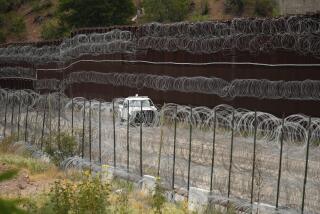After months of challenges and controversy, Trump’s travel ban expires Sunday — and a new one may be coming
Reporting from Washington — Days before the expiration of President Trump’s much-contested travel ban, the White House is reviewing a security report that aides say could serve as the basis of a new, and perhaps broader, version.
The classified report by the Department of Homeland Security, sent to the White House last week, is a study of the available security and intelligence information in countries worldwide, not just the six Muslim-majority nations subject to Trump’s order banning travel by their citizens to the United States. That order expires on Sunday.
Based on the findings, Trump could decide to keep the travel ban in place, or either limit or expand it, possibly before Sunday.
The order also stopped all refugee resettlement in the U.S. for 120 days, so that ban would continue in effect for roughly a month more. The Supreme Court in June had allowed the refugee ban to take effect, with exceptions for refugees who could show a “bona fide” connection to the U.S., along with a revised travel ban for 90 days in the six specified nations.
David Lapan, spokesman for the Department of Homeland Security, said it was “certainly possible” that more countries could come under travel restrictions.
“It’s about the conditions in the countries and the quality of information, and not the political or religious factors,” he said.
“You have Muslim-majority countries that are in civil war, you have Muslim-majority countries that have major terrorism problems,” Lapan said. “You could have countries that were not majority-Muslim that would have the same problems.”
The White House declined to comment, but Trump, writing on Twitter after the London train explosion last week, made it clear that he would like to put in place even broader travel restrictions.
“The travel ban into the United States should be far larger, tougher and more specific — but stupidly, that would not be politically correct!” he tweeted.
White House national security advisor H.R. McMaster on Sunday said a new travel ban would be a “first step in better screening” of who is trying to enter the country.
“This is something that we’re looking at — how to protect the American people better,” he said on ABC’s ”This Week.”
The security report provides an opening for the administration to try once again to reset its case for the ban, which has been under sustained attack in the federal courts ever since its helter-skelter rollout in the early days of Trump’s presidency.
On Jan. 27, a week after taking office, Trump signed an order banning entry to the U.S. from citizens of seven nations initially — Syria, Iran, Libya, Somalia, Sudan, Yemen and Iraq. Issued with scant notice to security agencies, the ban created confusion and protests at airports across the country before federal judges signed orders blocking its implementation.
On March 6, Trump signed a new order that dropped Iraq from the list but kept the ban in place for 90 days for the other six countries. The order instructed Homeland Security to conduct a “worldwide review” of security conditions to determine whether the U.S. could be confident that it could identify which travelers could pose a threat.
The Supreme Court allowed the order to take effect on June 26; the 90-day clock runs out on Sunday.
Lapan said it’s unlikely that countries such as Syria would drop off the list. “It’s hard to say that would happen because conditions in those countries wouldn’t change that much,” he said.
Trump himself has added to his administration’s challenges in defending the ban, starting with his call during last year’s campaign for a “total and complete shutdown of Muslims entering the U.S.” That allowed lawyers who opposed the measures to argue that they amounted to unconstitutional religious discrimination against Muslims.
Even after the ban was rewritten, and the president’s senior officials were telling reporters that the word “ban” was not accurate, Trump went on Twitter to insist it was a ban. He criticized the federal courts as well as his own Justice Department.
“The Justice Dept. should have stayed with the original Travel Ban, not the watered down, politically correct version,” he tweeted.
The Supreme Court is scheduled to take up the ban on Oct. 10, but that case might be moot if the administration replaces the order with a third version.
Times staff writer Brian Bennett in New York contributed to this report.
Twitter: @jtanfani
More to Read
Get the L.A. Times Politics newsletter
Deeply reported insights into legislation, politics and policy from Sacramento, Washington and beyond. In your inbox three times per week.
You may occasionally receive promotional content from the Los Angeles Times.











